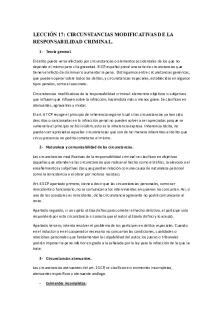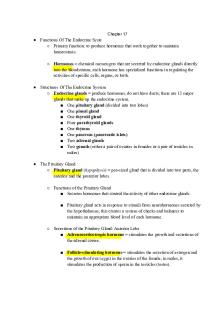17 Use of Force - Lecture notes 17 PDF

| Title | 17 Use of Force - Lecture notes 17 |
|---|---|
| Course | Public International Law |
| Institution | Durham University |
| Pages | 4 |
| File Size | 102.1 KB |
| File Type | |
| Total Downloads | 302 |
| Total Views | 534 |
Summary
Use of Force ● Use of force/jus ad bellum - Rules of international law that prohibit the unilateral use of force by states and provide for collective measures through the UN to maintain or restore international peace/security ○ Whether the recourse to force itself is legal ● DIFFERENT FROM jus in be...
Description
Use of Force ● Use of force/jus ad bellum - Rules of international law that prohibit the unilateral use of force by states and provide for collective measures through the UN to maintain or restore international peace/security ○ Whether the recourse to force itself is legal ● DIFFERENT FROM jus in bello → which governs conduct in armed conflict and military occupation (war) Where Did It Emerge? ● Just war theory - wars were fought on the basis of protecting a single individual, commerce (opium wars), rights to use land, honour, religion, etc. ○ No legal regulation → multiple justifications ● League of Nations sought to bring war within the realms of law and diplomacy → fell apart due to some countries joining, some leaving, invasions, etc. ● Kellogg Briand Pact 1928 ○ Concluded outside of the League of Nations and remains in effect (though UN Charter is preeminent law) ○ Article 1 - Condemns recourse to war for the solution of international controversies → cannot be used as an instrument of national policy in their relations with one another ● Atlantic Charter ○ US and UK joint declaration for the post war world ○ Clause 6 - safety within national boundaries, free from fear and want ○ Clause 8 - abandonment of the use of force Steps ● First look at UN Charter Art 2(4) ● The exceptions: ○ Invitation ○ Self Defence (Art 51) ○ Collective action under Ch VII ○ Peacekeeping UN Charter ● Rely on law and not violence → 2 fold scheme: ○ Prohibit the unilateral use of force by States ○ Centralize control over the use of force through the Security Council ● Jus in bello + jus ad bellum ● Peace vs opening of hostilities + use of force ● Principle of equality and non-intervention Art 2(4) ● All Members shall refrain in their international relations from the threat or use of force against the territorial integrity or political independence of any state, or in any other manner inconsistent with the Purposes of the United Nations ● ‘International relations’ - argue that things are internal (unification of territories) ○ Whether the conflict has been internationalized ○ Breakup of Yugoslavia → internal but was internationalized ● Threat or Use of Force ○ regardless of whether it amounts to war or not ○ Consideration for political or economic pressures ○ Nuclear Weapons case
■ Threat is illegal if it was actually carried out, the use would have been illegal Territorial integrity and political independence or other manner ○ Besides self-defence, to what extent is use of force prohibited? Is there residual discretion on States to protect the purposes of the United Nations? ○ Argument for humanitarian intervention → contested, is this contained in the residual right? ○ Two other justifications for force: ■ Self determination → resist colonial domination ■ Pursuit of democracy ● Rule of customary international law ● Nicaragua (Merits) Case ○ Reagan terminated economic aid to Nicaragua on the ground that it had aided fighting against the El Salvador Government (who was friendly with the US) by allowing the USSR to pass through en route to El Salvador ○ Nicaragua then claims the US had used armed forces by laying mines in Nicaraguan waters, attacking ports, etc.) and assisted Contras (Nicaraguan rebel group looking to overthrow government) ○ Held: ■ US breached customary international law not to intervene in the affairs of another State, not to use force, not to violate its sovereignty, and not to interrupt peaceful maritime commerce ○ US refused to comply → as a permanent member of the Security Council, could block any enforcement mechanisms Art 51 (Justification for use of force through self defence) ● Nothing in the present Charter shall impair the inherent right of individual or collective self-defence if an armed attack occurs against a Member of the United Nations, until the Security Council has taken measures necessary to maintain international peace and security ● Caroline Incident ○ Americans helped Canadian independence movement against British forces by sending men and supplies in the Caroline boat ○ Britain set the ship on fire → claimed self defense ○ Caroline test meant self defense must be necessary and proportionate: ■ Whatever is necessary to repel the force used by the other State ■ Action should be proportionate to bring the attack to an end ● Not in proportion to what they did to you ○ Criterion for self defense is described as instant, overwhelming, leaving no choice of means, leaving no moment for deliberation → then, will not give rise to state responsibility ● Self-defence during an armed attack ○ Armed attack → it’s scale and effects must be sufficient ■ Ex. cross border use of force by regular armed forces is not included ○ ‘Significant’ degree of government involvement ○ BUT in the absence of State involvement, possible to justify self defence against the state giving the terrorists a base or haven ■ Ex. US to use force against Afghanistan where Al Qaida terrorists were harboured (though Afghanistan and the Taliban did not commit the armed attack, did not support/fund Al Qaida, only refused to give them up) ● Collective self defence ○ Allows third States to intervene in a conflict when they are not directly attacked → ‘attack against one is an attack against all’ ●
○ Ex. NATO Protection of nationals abroad ○ Entebbe Incident ■ Israel flew to Entebbe and rescued hostages by force ■ Evidence seemed to suggest Uganda had not taken steps against hijackers and seemed to have assisted them ■ Israeli claims a right to protect their own nationals abroad as part of self defence → Western nations praised the operation… but the law surrounding this remains unclear ■ Draft resolution focussed on condemning hijacking and did not receive the necessary votes for adoption and another draft condemning Israel was not put to a vote at all ● Anticipatory or pre-emptive self-defence ○ Wording in Art 51 seems to suggest that the armed attack must have already started ○ Attack has to be IMMINENT → then you can strike first ■ Caroline Incident ■ Ex. ‘Six Days’ War’ - Israel attacked first, but but faced mobilization along their borders ○ Rise of preventative self defence → especially regarding terrorism ■ Ex. 9/11 → US ‘Operation Enduring Freedom’ against Afghanistan (preemptive self defence) ● Consideration… was this necessary and proportionate? The Global War on Terror that took many years of destruction? ○ Overall: ■ Preventative attack… not full recognized in law ■ Preemptive → only if imminent ● Reporting to the Security Council ○ Rights of self defence is temporary existing only until the Security Council acts ○ Consideration: power of the veto → Security Council may never act and the right of self defence will be of unlimited jurisdiction ○ Nicaragua (Merits) ■ US claiming to act by way of collective self defence for El Salvador, did not report to the Security Council on their steps against Nicaragua ● Rule of customary international law Permitted Exceptions: Chapter VII ● Powers to act in pursuance of Security Council resolutions passed under this chapter of the charter (collective security) ● Art 39 ○ Allows the Security Council to ‘determine the existence of any threat to the peace, breach of the peace or act of aggression’ ○ Security Council to make recommendations or decide measures ● Art 40 ○ Provisional measures (ex. ceasefires) before other measures may be taken ● Art 41 ○ Prescribe measures that do not require force ○ Ex. economic sanctions, severance of diplomatic relations, etc. ● Art 42-49 ○ Mechanics for force to enforce the Council’s will → ‘all necessary means’ ○ Ex. placing troops at the UN’s disposal ● implied/revived authorisation: ●
○
US and the UK have suggested that they were allowed to use force against Iraq → Iraq’s violations of the ceasefire breached the original resolution Regional Action: Chapter VIII ● Allows for regional arrangements to deal with appropriate questions of international peace and security ● In practice, this type of resolution must authorize a mission where member states will then enforce the Council’s will ○ UN and regional forces will combine and cooperate to make the intervention more effective ● Ex. NATO, African Union, Arab League, etc. Intervention, Civil Wars, Invitation ● GA 1970 Declaration on Friendly Relations Between States ○ Further than the Charter → duty to refrain from assisting/participating in acts of civil strife in another state and not to tolerate/incite armed activities directed towards the violent overthrow of another State ○ Duty not to intervene in the affairs of another State ● Nicaragua (Merits) ○ Distinguished between assisting a government of a State (lawful, by invitation of that State) vs assisting an opposition forcibly to overthrow a State (unlawful) → No general right of intervention in support of an opposition within another state ○ Invitation by a government resisting armed insurrection → complex and has been abused ○ Evident in this case → US ‘defending’ El Salvador against Nicaraguan incursions and supporting Contras against the government UN Peacekeeping ● Developed through practice → not in the charter ● After the Cold War, peacekeepers were deployed in an increasing number of civil conflicts...
Similar Free PDFs

LecciÓn 17 - Lecture notes 17
- 6 Pages

Chapter 17 - Lecture notes 17
- 15 Pages

Chapter 17 - Lecture notes 17
- 7 Pages

Use of Force - Lecture notes 1
- 5 Pages

Use of Force 2 - Lecture notes 2
- 3 Pages

LEC17 - Lecture notes 17
- 28 Pages

CH17 - Lecture notes 17
- 17 Pages

L18 - Lecture notes 17
- 2 Pages

Tulips - Lecture notes 17
- 3 Pages

17ATOC - Lecture notes 17
- 4 Pages

Persuasion - Lecture notes 17
- 2 Pages
Popular Institutions
- Tinajero National High School - Annex
- Politeknik Caltex Riau
- Yokohama City University
- SGT University
- University of Al-Qadisiyah
- Divine Word College of Vigan
- Techniek College Rotterdam
- Universidade de Santiago
- Universiti Teknologi MARA Cawangan Johor Kampus Pasir Gudang
- Poltekkes Kemenkes Yogyakarta
- Baguio City National High School
- Colegio san marcos
- preparatoria uno
- Centro de Bachillerato Tecnológico Industrial y de Servicios No. 107
- Dalian Maritime University
- Quang Trung Secondary School
- Colegio Tecnológico en Informática
- Corporación Regional de Educación Superior
- Grupo CEDVA
- Dar Al Uloom University
- Centro de Estudios Preuniversitarios de la Universidad Nacional de Ingeniería
- 上智大学
- Aakash International School, Nuna Majara
- San Felipe Neri Catholic School
- Kang Chiao International School - New Taipei City
- Misamis Occidental National High School
- Institución Educativa Escuela Normal Juan Ladrilleros
- Kolehiyo ng Pantukan
- Batanes State College
- Instituto Continental
- Sekolah Menengah Kejuruan Kesehatan Kaltara (Tarakan)
- Colegio de La Inmaculada Concepcion - Cebu




